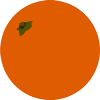Inter-
Mallory Tater
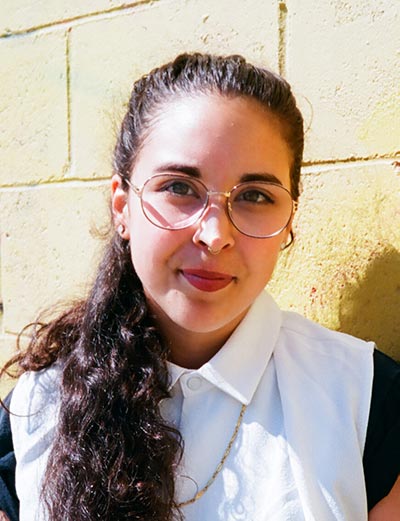
On Practice:
Do you write at the same time every day, in the same place? How would you describe your writing practice/s?
I am lucky enough to be able to maintain focus and even write decently (sometimes) when surrounded by background noise and/or people. So, I can make creative time wherever I am, whether I’m in a coffee shop, a bar, at my house, or even on a ferry. I don’t have to be in a specific place to get the words out.
I have months where I write and months where I don’t. I’ve always been like that. I don’t really journal or have a daily writing practice. I’m either in the thick of a writing project or I am simply not writing at all. Periods of quietude without writing seem to work for me. Then, when I do write, the words tend to spill onto the page in an obsessive or meditative way.
What do you do if you get stuck while writing a poem?
I abandon that piece and put those unsuccessful images or lines into my poem scrap folder (on my computer) in case I want to patchwork them into something else another day.
Take a photograph of a page from your notebook or a screenshot of an electronic file of a poem you have been recently writing or revising.
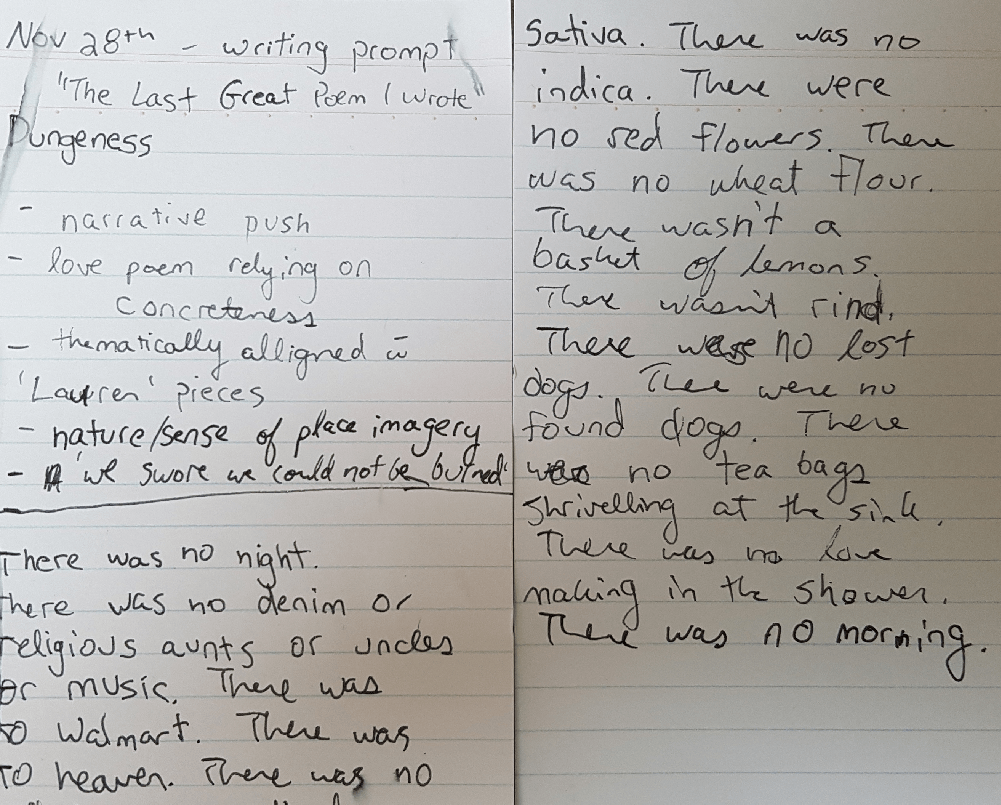
This poem results from a writing prompt I participated in when I was a visiting guest writer in Sheryda Warrener’s University of British Columbia undergrad class!
On Poetry:
Is there something you once believed about poetry that you no longer hold true? What changed?
I used to think a poem was basically a beaded necklace of various metaphors strung together, and that poetry didn’t hold story well. Once I explored more narrative poetry and started reading work by poets who delve into narrative and borrow techniques from fiction, I learned that I really enjoy writing poetry with a vocal arc, characterization, and a sense of place.
What can/does poetry change?
Poetry can undo someone’s lack of empathy toward someone or something because it emotes different ways of being and different lived experiences through voice and imagery. A haunting, successful poem lingers, leaves a mark, and can change how a reader might view someone’s experience, journey, or values. I think poetry helps us bridge our lives from parallel existence to something stronger, something collective. It brings me comfort that poetry is becoming more widely shared and accessible within the main stream—we need it to grow because poetry fosters care, community, and kindness.
Is there something you now think you know about poetry that you wish you’d known a decade ago?
Acrostic poems are not poetry. But you can still write them for people in birthday cards. That’s it. That’s the only time.
On Influence & Inspiration:
What books are on your night stand, the back of the toilet, your desk?
Abbi Jacobson’s I Might Regret This (at my sister’s house so I can pick it up when I visit her)
Yotam Ottolenghi’s Cookbook Simple (resting behind the toaster, ready to use)
Marie Howe’s What The Living Do (in my briefcase)
Octavia Butler’s Kindred (on my nightstand)
Arianna Reine’s Mercury (on the coffee table)
Which writer/s do you (re)read the most? What does the writing do for you upon return?
Kayla Czaga’s poetry moves me in ways poems never have before. Her work is colloquial, wry, horror-inducing, tender, careful, and restrained. Her new book Dunk Tank is coming out soon with House of Anansi and I cannot wait.
Among the poets you most admire, who has influenced you the least? Why have you not been influenced by his/her work?
Amber Tamblyn’s work is really lyrical, fresh, and moving. Her book Dark Sparkler revolves around the lives of Old Hollywood matriarchs. I don’t really write biography. Autobiography, yes. But not biography on well-known people. Her poems are fantastic and vivid, like she’s answered the having-dinner-with-a-deceased-star game with an entire book.
Describe a moment from your life when you've been overcome by how beautiful something is.
My friend who suffers from depression was able to make it to my recent autumn wedding. She lives across the country. I went out to meet her bus coming from the airport in my pajamas. Seeing her at the crosswalk with her suitcase and beaming face was beautiful. It was a clear day and it seemed like the mountains and city were welcoming her. We ran across the crosswalk as soon as we could to embrace each other. It was a small moment, but it’s kind of big to me. I think about it all the time.
On Teaching:
How would you describe poetry to a four-year-old? To the non-literary family ancestor you imagine as a great source of who you are?
Poems are jimble-jambles. Poems are feeling-puzzles.
Poems are my self-care.
What characteristics does your ideal poem possess?
An atmospheric setting—domestic or natural. A setting that is alive and contributing to the tension and tone of the piece.
Do you teach poetry? If so, what are you trying to teach through poetry? What has poetry taught you?
Yes, I’ve taught at the high school and university level. I always really try to emphasize the importance of concrete imagery and sensory details, taking precedence over abstractions.
Poetry has taught me to embrace the manipulation of language, to tell story, as well as to not be afraid to make language fresh and fun in its usage and presentation.
On Publishing & Themes Present/Future:
How has publishing your poems changed your writing practice, process, and product?
Publishing my first book, This Will Be Good, forced me to think of the poems in conversation with each other, rather than just one poem at a time standing alone. Now I seem to be able to write more poems subsequently, and I find the poems speak to each other organically, if I am honing in on a particular subject matter or muse.
Is there a poem you've always wanted to write but haven’t? If so, why are you waiting? What subjects, themes, forms, aesthetics, etc. do/will you explore in your work?
I have always wanted to write a poem about Margaret Hamilton, who played the Wicked Witch of the West in the 1939 film Wizard of Oz (which would actually then be my first real biographical poem and may speak to Amber Tamblyn’s concept behind Dark Sparkler!). Margaret Hamilton endured severe burns from a fire incident on set. She also gained an intense and long-lasting reputation for being scary and feared by children for most of her life after the film. The most successful movie and movie role of a lifetime proved to paint her in a difficult light, a painful one.
On Oranges:
Oranges or apples? Why?
Apples. Gala and Granny Smith. Apples have this antioxidant called quercetin in them, which helps strengthen the immune system during stress and cold season.
About the Poet
Mallory Tater is a writer from Ottawa living in Vancouver. Her debut book of poetry This Will Be Good (Book*hug Press) was released Spring 2018. She is the publisher of Rahila’s Ghost Press, a poetry chapbook press. Her debut novel The Birth Yard is being released with HarperCollins Canada in 2020.
Inter-
Curtis LeBlanc
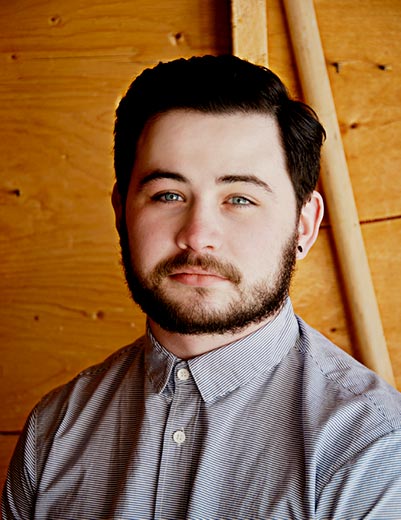
On Practice:
Do you write at the same time every day, in the same place? How would you describe your writing practice/s?
For the longest time, I’ve been almost strictly an at-home writer. Usually, I write on my stomach in bed with a stack of pillows under my chest and my computer in front of me, in a kind of half upward dog pose. Lots of friends poke fun at me for this, but it just works. These days, though, I’ve been working half of the time at coffee shops to get out of the house on my days off from teaching. Early afternoon is when I’m most productive, when I have the most clarity.
What do you do if you get stuck while writing a poem?
My cure for “the wall” has always been to take a quiet bath. I’ve solved most of my hardest writing problems in the tub.
Take a photograph of a page from your notebook or a screenshot of an electronic file of a poem you have been recently writing or revising.
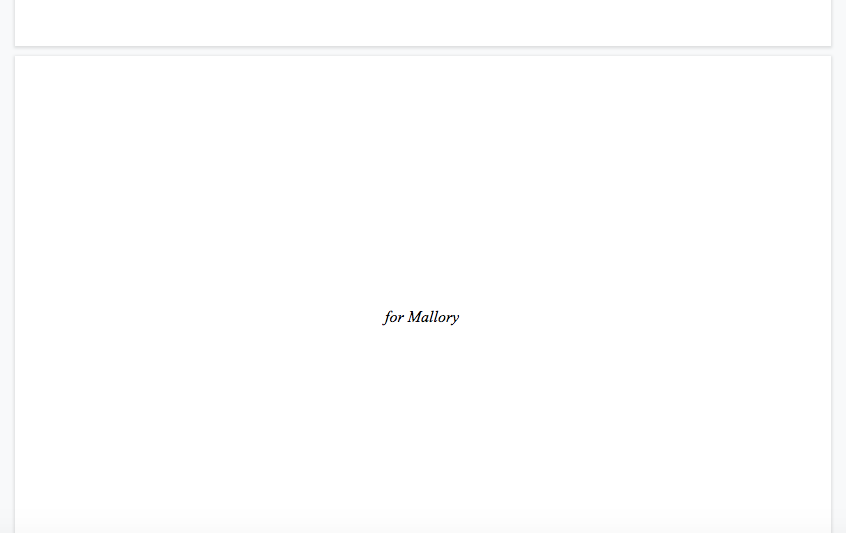
On Poetry:
Is there something you once believed about poetry that you no longer hold true? What changed?
When I was younger, I thought every detail of every poem had to be absolutely true. It was a bit of a compulsion for me to always look for and insert that verifiable detail from my life. As I’ve grown as a writer, I’ve learned to branch out and combine experiences, both imagined and real, into poems in order to really make them sing. Though I do still tend to write autobiographical poetry, it’s been really freeing for me as a writer.
What can/does poetry change?
Hopefully, the way people see the world. I think really great poems can do this. Really good ones can definitely shift people’s beliefs, or affirm those positive ones (I hope). I keep seeing articles pop up about the emergence of poetry as a go-to form for readers and writers in response to the difficult times we’re currently living in and that gives me hope (there’s that word again) and some bit of consolatory joy.
Is there something you now think you know about poetry that you wish you’d known a decade ago?
I wish I’d known how much love and community and satisfaction poetry brings me, because I would have written a lot more of it when I was younger. It’s not that I wasn’t writing poems, but at that point in time, about ten years ago, I was so stubborn about writing fiction. It’s not that I don’t still enjoy writing fiction—it’s my primary project on the go right now—but I probably would have been writing closer to a fifty-fifty split back then had I known just how much poetry means to me today.
On Influence & Inspiration:
What books are on your night stand, the back of the toilet, your desk?
I have The Lesser Blessed by Richard Van Camp with me everywhere I go these days. I’m teaching it for the second time to my high school students. Each time I read this short novel it gains another layer for me. I had a student tell me last year that they didn’t know books like Van Camp’s existed in the world. That was an important moment for me as a teacher, one where I felt I was somehow doing something right. Daniel Winkler’s A Field Guide to Edible Mushrooms of the Pacific Northwest is in front of me right now, too. I’m planning on doing some mushroom picking this spring/summer, and I’ve been studying up so I don’t poison myself.
Which writer/s do you (re)read the most? What does the writing do for you upon return?
Philip Levine is a poet who I’m constantly revisiting. I’m in awe of his ability to meander through confessions and stories and tie them all together with a truly surprising and resonant observation or statement at the end. Natalie Shapero’s book, Hard Child, I’ve been going back to a lot as well, for her mastery of the subtle sound-play in common language. Every time I return to a book I really love, I find it makes me want to write—right there and then.
Among the poets you most admire, who has influenced you the least? Why have you not been influenced by his/her/their work?
This isn’t a totally accurate answer, because she was an excellent teacher and mentor to me in my MFA—second to none—but when I first read Karen Solie’s work I thought to myself, you probably won’t ever be able to write like this. Her work is so intelligent and exact and polished and mine has always tended to sprawl and meander. I didn’t even dare try to emulate it.
Describe a moment from your life when you’ve been overcome by how beautiful something is.
When I was a teenager, obsessed with punk and figuring out whatI would do when I was older I knew I wanted it to somehow be rooted in expressing myself. I always thought there was something profound about swinging on a swing set. It’s peaceful and meditative, being suspended there, the predictability of the pendulum. Even when my wife and I were first dating, we used to go across the street from my old apartment at night and just swing together.
On Teaching:
How would you describe poetry to a four-year-old? To the non-literary family ancestor you imagine as a great source of who you are?
I would tell them poetry is just words and we’ve all got them.
What characteristics does your ideal poem possess?
Some aspect of truth.
Do you teach poetry? If so, what are you trying to teach through poetry? What has poetry taught you?
I get to teach poetry to high school students; the first thing I emphasize is that regardless of the final product, the act of writing poetry is an amazing privilege. Poems helped me to make sense of my life and the world around me. That’s what I tell students to do. Think, reflect, consider your experiences—and then try and tell some truth about them.
On Publishing & Themes Present/Future:
How has publishing your poems changed your writing practice, process, and product?
I’ve been writing long before I was being published, but publishing has definitely been encouraging. It’s created a sense of urgency in me to produce. It makes me feel like I’m closer to that teenage punk rock dream of earning a living expressing myself.
Is there a poem you’ve always wanted to write but haven’t? If so, why are you waiting? What subjects, themes, forms, aesthetics, etc. do/will you explore in your work?
There are aspects of my mental health that I’ve always struggled to find the words for. I’m only just beginning to, I think. I know it’s going to be a long process before I ever really get it all on the page in a way that feels ultimately satisfying.
On Oranges:
Oranges or apples? Why?
Oranges. I remember getting a ride to hockey practice in my friend Steve’s parents’ van when I was about thirteen and between the two of us we ate a carton of them in the half-hour it took to get to the arena in Legal, Alberta.
About the Poet
Curtis LeBlanc was born and raised in St. Albert, Alberta. His poetry has won the Readers' Choice Award in Arc's Poem of the Year competition and been shortlisted for The Walrus Poetry Prize. His first collection, Little Wild, was published by Nightwood Editions (2018). He lives in Vancouver with his wife, Mallory Tater.
